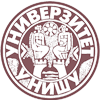Navigation
Schedules Events:
Project
According to wider objectives and specific objectives of the project, the proposed project is expected to achieve following outcomes:
1) Introducing of content and modernization of curriculums in field of Management of Product Development and Innovations management, Eco-product development and Industrial Product Development,
2) Implementation of new and improving of existing curriculums
3) Introduction of continuous education courses
4) Development and introduction of training in Industrial Product Development of teachers at colleges of applied sciences
5) Quality control and monitoring
6) Dissemination
7) Sustainability
8) Project management
The expected outcomes will be achieved by realization of activities grouped into eight work packages.
In the first work package competency framework and expected learning outcomes for targeted groups will be defined. Based on defined competency framework and expected learning outcomes, new curriculums will be developed and modernization of existing ones will be performed.
New degree programs will offer an integrated curriculum in the field of industrial product development and economics, with special emphasis on innovation processes. The main objective of the degree programs would be to train human resources who gravitate to the product development activities in the application of modern methods, systems and processes of industrial product development, innovation management and development of eco-products.
Curriculums in field of Management of Product Development and Innovations management will be divided into two groups of subjects belonging to the fields of economy and engineering. The first part will provide a solid foundation in economic skills, in which the key concepts and themes will be processed, which every manager should know. The goal of the economic part of the curriculum is to develop required competences in fields of Accounting, Project management, Finance and Banking, Marketing, Law and Contracts, Human resources management and Quality management.
The goals of the engineering part of the curriculum is to develop required competences in the fields of Information Systems, Design, Simulation, Integrated product development, Validation, Production and Performance Evaluation, Systems engineering and Multi-technological Systems.
The curriculums in Eco-product development and Industrial product development will focus more on engineering fields of study, but they will also develop required competences in Project management, Human resources management and Quality management. The curriculum in field of Eco-product development will also develop required competences in the areas of Eco-design, Dismantling, Recycling and Environmental protection.
The courses within the new/modernized curriculums will integrate theoretical and methodological knowledge aimed to make a decisive contribution to the promotion of theoretical and methodological competence. Courses programmes will be designed to promote the development of creativity and the potential to elaborate by combining the lectures with independent development work of the students.
To accomplish those goals courses will be divided into three different components:
- Lectures,
- Workshops, and
- Student work on development projects.
These components will cover different educational goals. The lecture, always the major component of the education concept, will provide the theoretical fundamentals for both the other educational components. Purpose of other components is to enable students to in practice implement their knowledge because in that way best education results are achieved. Student work on development projects will be realized during the student practice.
The aim of the second work package is to establish supportive teaching environment. In the second work package training courses for PC university staff are planned. On these courses, qualified persons from EU universities will provide training in pedagogical methodology as well as the training in areas of MPD&IM, EPD and IPD. In addition, modernization of teaching equipment and teaching aids is also planned. Furthermore, within this work package the development of student practice will be performed. The last activity is enrollment of students in new and modernized accredited degree programs.
In the third work package, curriculum of continuous education courses in Industrial Product Development will be developed based on definition of required competences and learning outcomes within this work package. Upon the preparation of education materials for continuous education courses, the enrolment of participants will be performed. Continuous education courses will be defined for young professionals, future engineering executives and unemployed persons interested in career path in areas of Industrial product development. These courses will be organized through realistic product development projects, defined by a regional industrial enterprise. Besides learning trough practice, course participants will develop new products for the company which defined the development task. Necessary framework for realistic product development projects and admission of industry human resources will defined by development of business and marketing plan aimed towards development and expansion of the network with regional industrial enterprises
The aim of this fourth work package is training and transfer of knowledge and experience regarded with modernized curriculum in Industrial Product Development to the teachers at colleges of applied sciences. During the first activity the analysis of the state of education in the field of Industrial Product Development in colleges of applied sciences will be executed in order to determine whether the competence framework and learning outcomes in the field of Industrial Product Development at colleges of applied sciences meet the needs of regional industrial enterprises and labor markets. Based on above analysis the structure and content of the training courses for teachers at colleges of applied sciences will be defined. After the preparation of education materials for training courses, the enrolment of course participants will be performed. Upon the end of training sessions the trained teachers from colleges of applied sciences will apply their newly acquired knowledge to restructure existing subjects toward modernization of education in Industrial Product Development.
Total expected number of participants is:
- 500 in accredited degree programs,
- 100 in continuous education courses,
- 50 in training courses for teachers from colleges of applied sciences.
Quality control (work package 5) of project activities and results will be continuously performed during the project realization, with evaluation done in several ways. For quality ensuring of the education process, three independent reviews are planned to be carried out. The peer reviews will be performed by EU universities staff that will carry out reviews of new and modernized degree programs, training courses and pedagogical methodologies. Also, all PC Universities will perform self-evaluation by standards defined by responsible authorities. Other activities in this work package include inter-project coaching by engagement of expert consultant with previous experience in realization of Tempus projects and definition of action plan for the project quality assurance. Action plan will define strategy and policy of quality control, assurance, improvement and development, as well as administrative and organizational tasks related to self-evaluation and quality improvement of study programs.
In work package 8, several meeting are planned. At kick-off meeting project management teams will be defined. Each work package will have its own manager. There will be three levels of Management: Work package managers, Internal Project Management and Project Management Committee. Project Management Committee will consist of all the partners, while the Internal Project Management will consist from the members of universities involved into project. These managers will monitor how the project is progressing in terms of expenses, use of resources, and implementation of activities and delivery of results. In order to achieve defined objectives of the project, the noted management bodies will systematically collect, analyze and use relevant information about project progress. Regular reviews will provide an opportunity to reflect on progress, agree on the content of progress reports and follow-up action required. Also, in this work package, project coordinator will, after consultation with EU universities, define manual for project management, which will defines how the project is executed, monitored, and controlled. This manual will be adopted on the kick-off meeting. For successful functioning of the project, annual and semi-annual meetings are planned. At these meetings, members of management bodies will discuss the current state of project realization and the difficulties encountered during project implementation.






